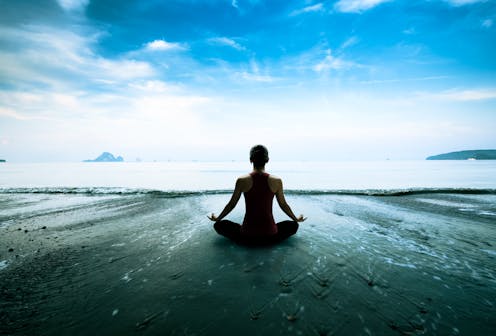
Have you ever gazed out at the sea and felt the world become smaller? Perhaps you have swum in its waters and felt that time stood still, that the noise and chatter of the world faded away to a distant whisper, or you have marvelled as the sun slid gently beneath its horizon.
In these moments, we often feel a sense of admiration or amazement, a feeling of smallness in the face of something so immense that it leaves us speechless. Maybe this is because we are ourselves 70 % water, or because the sheer scale of the sea puts us in perspective, reminding us of our connection to something much larger. This range of feelings – referred to as “awe” – has been extensively researched by psychologists.
Being near natural bodies of water, especially the sea, has proven health benefits. This effect has been dubbed “blue health”.
Scientists have offered a number of explanations for these benefits. Being near water often means we do more physical activity, while natural surroundings also have a restorative effect on our mental wellbeing and social lives, meaning they also have mental health benefits. Furthermore, blue spaces can improve overall environmental quality, which brings indirect health benefits.
The origin of life itself
Life on Earth began in the oceans. In addition to being a vital source of nutrients and resources, the sea is therefore our biological point of origin.
Our sweat and tears share the sea’s salty composition, and there is a surprising similarity between how elements of the sea and our bodies work. Applied to natural surroundings more generally, this link even has a name: biophilia.
The biophilia hypothesis is one of the three main theories that explain humans’ attraction to the sea. The other two are the theory of psychophysiological stress recovery, and attention restoration theory. These ideas are not mutually exclusive, and all three contribute to the sense of wellbeing that the sea gives us.
Be it walking on the sand, in a boat on its surface, diving beneath the waves, or just observing or meditating on it, the sea allows us to set our mental struggles to one side and to feel free. It can help us to find what psychologists call “restoration”, and this sense of wellbeing is something we often struggle to find on our own.
Blue health can be a powerful tool in reducing stress and improving our moods. Our connection to nature helps us to put our own worries in perspective – it restores our attention by warding off the preoccupations that dominate our attention in our daily lives.
Sea, sport and disability
Many people with disabilities or injuries that prevent them from walking or moving easily on land can bathe in the sea. It can offer them a moment to close their eyes, breathe, and perhaps even feel a sense of bodily freedom or autonomy.
For this reason, water sports (especially in the sea) can play a huge role in promoting psychological wellbeing for disabled people. Boats, equipment and activities can be adapted to include everyone, no matter their abilities.
From specialised sailboats and diving therapy to yoga and meditation on stand up paddle boards, there are many activities that can help people to connect with the sea and feel its benefits.
Not only do they bring physical and emotional wellbeing, these activities also allow a person, regardless of their limitations, to experience the freedom and connection that the sea can offer. The sea belongs to everyone, and we all deserve to feel its immense, transformative power.
David Gallardo-Pujol receives funding from the Spanish State Research Agency (AEI), the Catalan Agency for Management of University and Research Grants (AGAUR), the Fundació la Marató de TV3, and the Bosch i Gimpera Foundation.
Jordi Renom Pinsach y Laura Viñals Vilà no reciben salarios, ni ejercen labores de consultoría, ni poseen acciones, ni reciben financiación de ninguna compañía u organización que pueda obtener beneficio de este artículo, y han declarado carecer de vínculos relevantes más allá del puesto académico citado.
This article was originally published on The Conversation. Read the original article.







